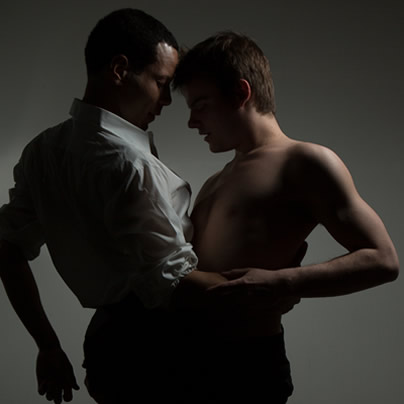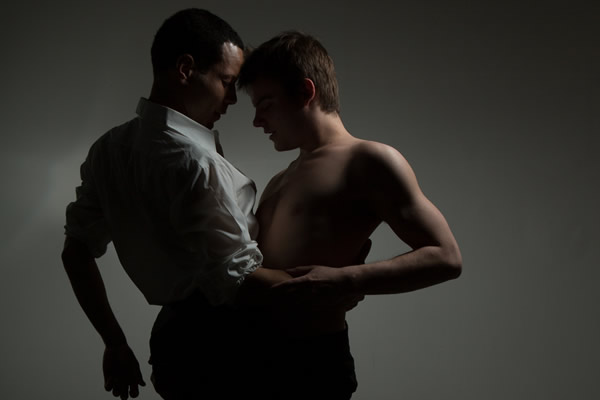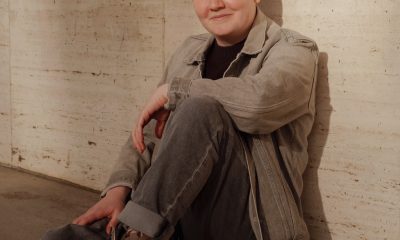Arts & Entertainment
Delicate dances
Studio double header explores romantic nuances


Actors Jon Hudson, left, and Alex Mills in ‘2-2 Tango.’ (Photo by Igor Dmitry; courtesy Studio)
‘Pas de Deux: Plays from New Zealand and Canada’
Through May 19
Studio 2ndStage
1501 14th Street, NW
$30-$35
202-332-3300
studiotheatre.org
Jim only likes to do it with the lights off. And when it’s the first time, he likes to go to the other guy’s place. But James, the interested guy that Jim just met at the club, doesn’t like to bring new guys home either. Sometimes it’s hard to get them out in the morning. This could be problematic. But despite the many little bumps that might derail their destiny before it even gets going, they become a couple — for a while anyway
Out playwright Daniel MacIvor’s “2-2 Tango” (now at Studio 2ndStage) hastily moves through the arc of Jim and James’ brief love affair beginning with their nocturnal meeting, an early passion, the blissful honeymoon to discontent and ultimate parting. Told mostly from inside the respective guys’ heads, MacIvor frames the same-sex romance as an ongoing dance with varied steps (disco, jazz and a seductive tango), beats and counts. And smartly director Eric Ruffin has cast a pair of appealing actors who can really dance as the lovers — Jon Hudson Odom plays Jim, the needier of the pair, and Helen Hayes Award-winning out actor Alex Mills is the more resilient James.
Not long after they meet, James says he’s independent and values an independent partner. Eager to please, Jim hastily nods in agreement, but his actions indicate otherwise. For him, independence isn’t a priority. James wants space. A cloying boyfriend isn’t what he had in mind. Things don’t look good.
But along the way, there are sexy exchanges, some songs and a lot of rug cutting (choreographed by Nancy Bannon) and quality hip shaking. And while McIvor’s one act flirts with the too cutesy, he captures the disparities of love with laser-like precision. The depiction of the couple’s not mutually sought breakup is uncomfortable to watch. It’s also the play and actors’ most honest moment.
“2-2 Tango” is one of two relationship-exploring plays that make up Studio2ndStage’s aptly-titled “Pas de Deux” (dance for two). The evening’s first one act is “Skin Tight,” a couple’s rough tumble down memory lane by New Zealand playwright Gary Henderson. Unlike McIvor’s piece, which focuses more on how people get together, Henderson’s play starkly reveals the details and intimacies of a longer union. But just because we’re dealing with a presumably more settled couple here, don’t expect the action (staged by Johanna Gruenhut) to be desultory or slow moving. Henderson’s one act opens with husband and wife wrestling wildly — a scene that initially reads more violent crime than playful roughhouse.
Tom and Elizabeth have been together forever. Recently they’ve lost their farm and now Elizabeth plans to go away. Together they reminisce: meeting as youths, the horrors of war, Elizabeth’s uneasy relationship with their daughter. Intermittently throughout the long conversation, they romp and wrestle (these kinetic antics belie the characters’ true age and reality). She shaves him with a straight edge razor. He peels an apple with a pocket knife. They engage in erotically charged knife play — the usual stuff. Led by the more emotional and impulsive Elizabeth, the married couple reveal the most tender and painful details of their relationship.
Henderson’s funny and heartfelt script is a stunning mix of poetic and plain language. As Tom and Elizabeth, Jens Rasmussen and Emily Townley are at home with the words and action; they give terrific, fearless performances.
JD Madsen’s simple sets are pleasingly spare: a patch of Astroturf and rusted bathtub for “Skin Tight” and a sleek sunken dance floor for “2-2 Tango.” Jedidiah Roe’s evocative lighting — quiet to fiery, and James Bigbee Garver’s ably done sound design add to the effect.
“Pas de Deux” is all about being with someone. And though dissimilar, they both convey the complexity and universality of relationships. So different, yet so well coupled.

Team DC, the umbrella organization for LGBTQ-friendly sports teams and leagues in the D.C. area, held its annual Night of Champions Awards Gala on Saturday, April 20 at the Hilton National Mall. The organization gave out scholarships to area LGBTQ student athletes as well as awards to the Different Drummers, Kelly Laczko of Duplex Diner, Stacy Smith of the Edmund Burke School, Bryan Frank of Triout, JC Adams of DCG Basketball and the DC Gay Flag Football League.
(Washington Blade photos by Michael Key)




















The 2024 National Cannabis Festival was held at the Fields at RFK Stadium on April 19-20.
(Washington Blade photos by Michael Key)
















Covering the @NatlCannaFest at RFK Stadium for @WashBlade . Stop by the LGBTQ+ booth and pick up a paper if you are here. pic.twitter.com/is7hnsaPns
— Michael Patrick Key (@MichaelKeyWB) April 20, 2024
Theater
‘Amm(i)gone’ explores family, queerness, and faith
A ‘fully autobiographical’ work from out artist Adil Mansoor

‘Amm(i)gone’
Thorough May 12
Woolly Mammoth Theatre
641 D St., N.W.
$60-$70
Woollymammoth.net
“Fully and utterly autobiographical.” That’s how Adil Mansoor describes “Amm(i)gone,” his one-man work currently playing at Woolly Mammoth Theatre.
Both created and performed by out artist Mansoor, it’s his story about inviting his Pakistani mother to translate Sophocles’s Greek tragedy “Antigone” into Urdu. Throughout the journey, there’s an exploration of family, queerness, and faith,as well as references to teachings from the Quran, and audio conversations with his Muslim mother.
Mansoor, 38, grew up in the suburbs of Chicago and is now based in Pittsburgh where he’s a busy theater maker. He’s also the founding member of Pittsburgh’s Hatch Arts Collective and the former artistic director of Dreams of Hope, an LGBTQ youth arts organization.
WASHINGTON BLADE: What spurred you to create “Amm(i)gone”?
ADIL MANSOOR: I was reading a translation of “Antigone” a few years back and found myself emotionally overwhelmed. A Theban princess buries her brother knowing it will cost her, her own life. It’s about a person for whom all aspirations are in the afterlife. And what does that do to the living when all of your hopes and dreams have to be reserved for the afterlife?
I found grant funding to pay my mom to do the translation. I wanted to engage in learning. I wanted to share theater but especially this ancient tragedy. My mother appreciated the characters were struggling between loving one another and their beliefs.
BLADE: Are you more director than actor?
MANSOOR: I’m primarily a director with an MFA in directing from Carnegie Mellon. I wrote, directed, and performed in this show, and had been working on it for four years. I’ve done different versions including Zoom. Woolly’s is a new production with the same team who’ve been involved since the beginning.
I love solo performance. I’ve produced and now teach solo performance and believe in its power. And I definitely lean toward “performance” and I haven’t “acted” since I was in college. I feel good on stage. I was a tour guide and do a lot of public speaking. I enjoy the attention.
BLADE: Describe your mom.
MANSOOR: My mom is a wonderfully devout Muslim, single mother, social worker who discovered my queerness on Google. And she prays for me.
She and I are similar, the way we look at things, the way we laugh. But different too. And those are among the questions I ask in this show. Our relationship is both beautiful and complicated.
BLADE: So, you weren’t exactly hiding your sexuality?
MANSOOR: In my mid-20s, I took time to talk with friends about our being queer with relation to our careers. My sexuality is essential to the work. As the artistic director at Dreams of Hope, part of the work was to model what it means to be public. If I’m in a room with queer and trans teenagers, part of what I’m doing is modeling queer adulthood. The way they see me in the world is part of what I’m putting out there. And I want that to be expansive and full.
So much of my work involves fundraising and being a face in schools. Being out is about making safe space for queer young folks.
BLADE: Have you encountered much Islamophobia?
MANSOOR: When 9/11 happened, I was a sophomore in high school, so yes. I faced a lot then and now. I’ve been egged on the street in the last four months. I see it in the classroom. It shows up in all sorts of ways.
BLADE: What prompted you to lead your creative life in Pittsburgh?
MANSOOR: I’ve been here for 14 years. I breathe with ease in Pittsburgh. The hills and the valleys and the rust of the city do something to me. It’s beautiful, it’ affordable, and there is support for local artists. There’s a lot of opportunity.
Still, the plan was to move to New York in September of 2020 but that was cancelled. Then the pandemic showed me that I could live in Pittsburgh and still have a nationally viable career.
BLADE: What are you trying to achieve with “Amm(i)gone”?
MANSOOR: What I’m sharing in the show is so very specific but I hear people from other backgrounds say I totally see my mom in that. My partner is Catholic and we share so much in relation to this.
I hope the work is embracing the fullness of queerness and how means so many things. And I hope the show makes audiences want to call their parents or squeeze their partners.
-

 South America4 days ago
South America4 days agoDaniel Zamudio murderer’s parole request denied
-

 Maryland5 days ago
Maryland5 days agoMontgomery County police chief discusses arrest of trans student charged with planned school shooting
-

 State Department23 hours ago
State Department23 hours agoState Department releases annual human rights report
-

 Theater4 days ago
Theater4 days ago‘Amm(i)gone’ explores family, queerness, and faith











